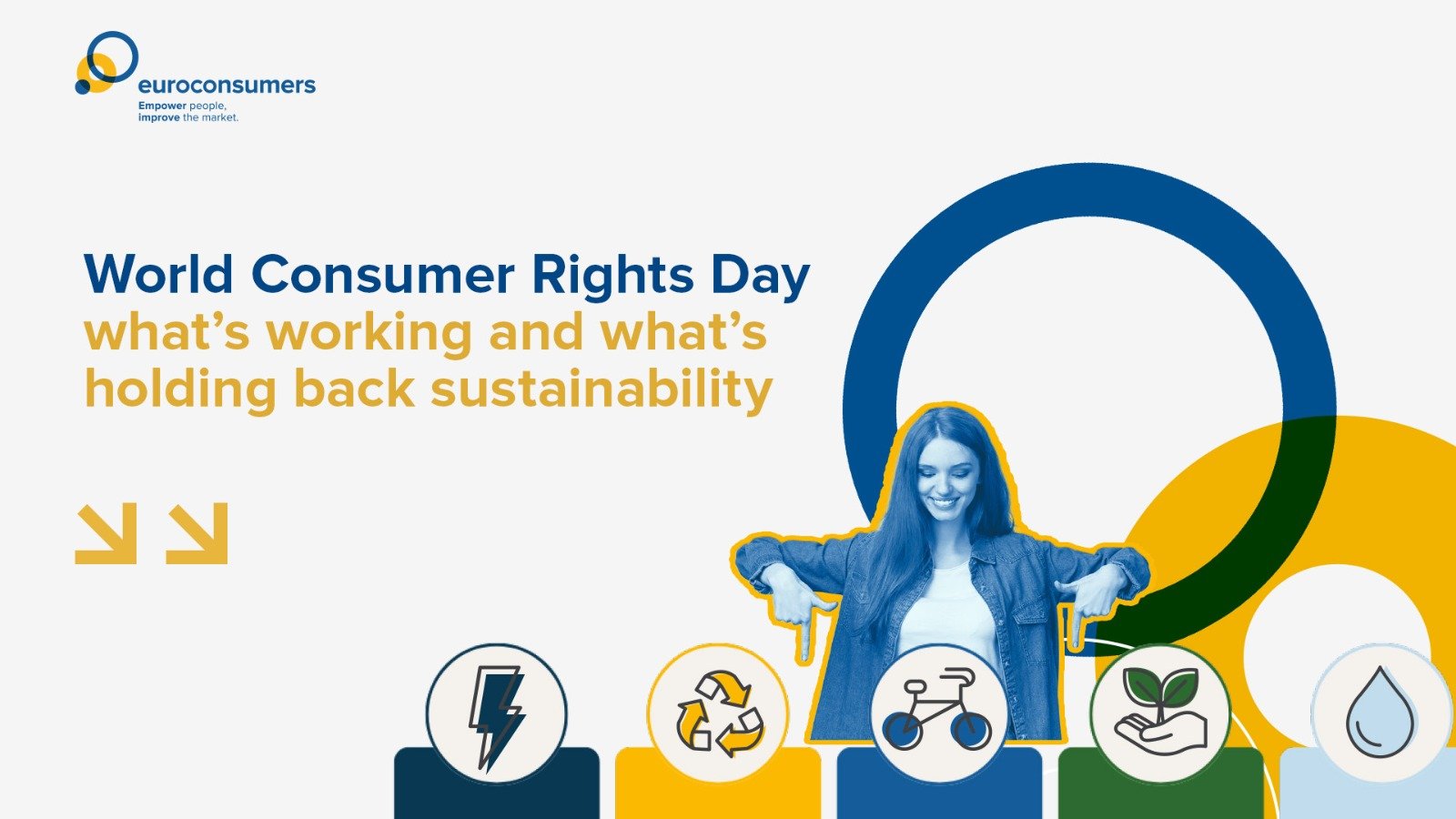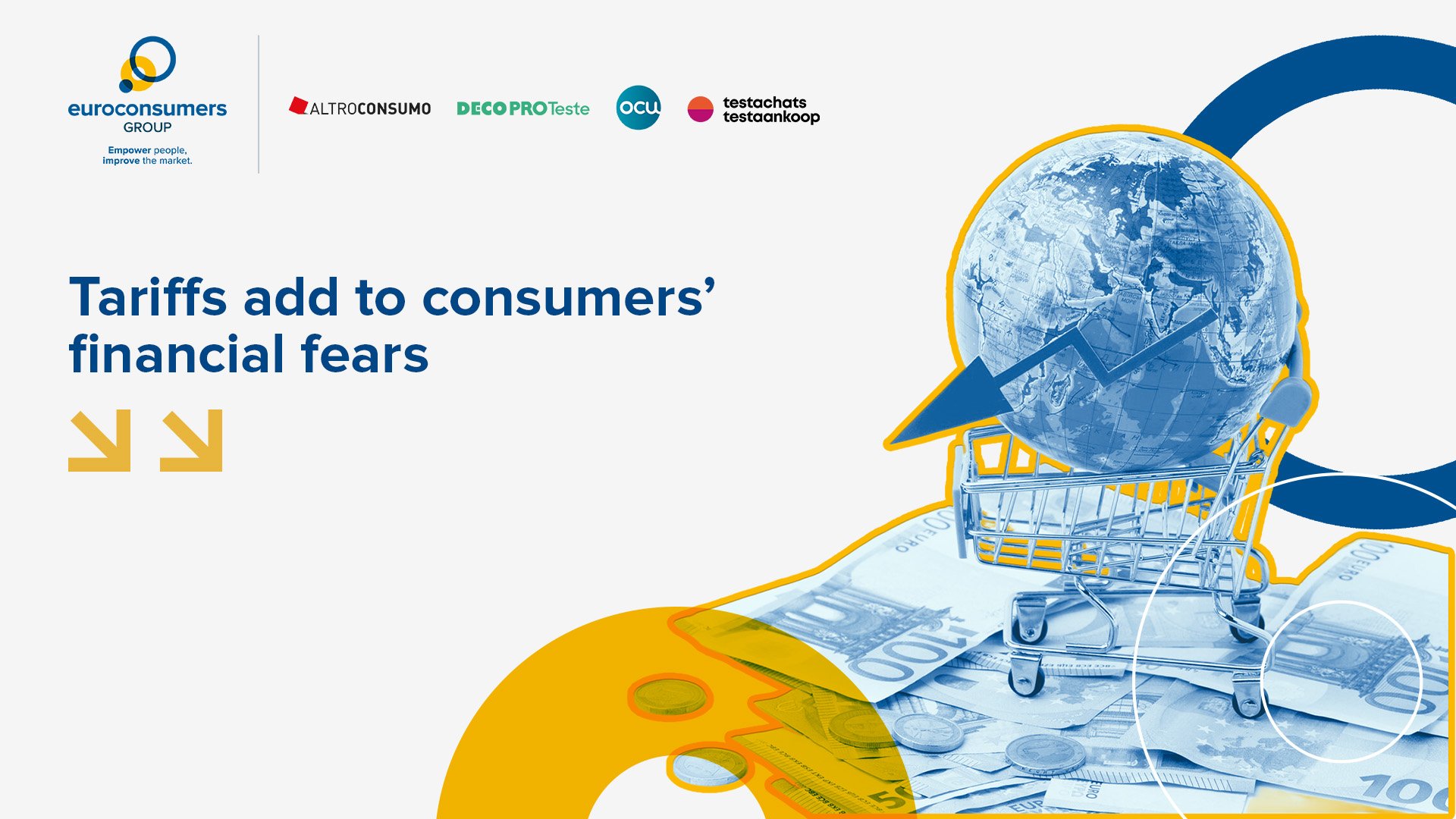
World Consumer Rights Day: What sustainable choices are consumers making an...
On World Consumers Rights Day 2025 we ask what’s working and what’s holding back sustainability in consumer decision-making.
Read More


Tariffs and an imminent ‘trade war’ have been in the headlines for weeks after the United States introduced new international trade policies which put much higher taxes and duties (otherwise known as ‘tariffs’) on imports from particular countries.
The US has started to apply tariffs of 10% on products and services from the EU entering the American market. In response, the European Commission has hinted that it could impose “counter-tariffs” on US goods and services.
Tariffs are likely to bring more economic and financial disruption, which leaves consumers who have lived through the last years of supply shocks and inflation spikes very concerned.
Two recent Euroconsumers surveys give a vital insight into how consumers feel about both their general finances and the impact of upcoming tariffs instability.
Here we share the headlines from our Annual Consumer Affordability Barometer which has tracked the finances of households since 2019. The Affordability Barometer survey was carried out before the latest round of tariffs, and so we ran a one-off 2025 Tariff and Trade survey for an instant update on how consumers feel about the new landscape.
The Consumer Affordability Barometer scores each country on how easy consumers are finding it to balance their finances and quality of life on a scale of 0 – 100. A higher score shows an easier balance, a lower score shows things are more difficult.
This year saw minimal improvements, with affordability only just on the rise. For example, in Belgium and Italy there was only a three point improvement in those reporting they were in financial difficulties.
The Tariff survey showed those struggling financially are the most concerned about rises in costs, 87% of them expected costs to rise (versus 73% of people overall).
A large percentage of respondents believe that tariffs will affect their family’s cost of living. The percentage is highest in Spain at 89%, followed by Belgium (84%), Portugal (83%), and Italy (78%). This will undoubtedly make any gains felt over the past year feel very precarious/
Saving money is a major struggle for most people. The Affordability Barometer figures show a persistent challenge: even with inflation and expenses easing, many families surveyed are living paycheck to paycheck, with little to no financial safety net.
69% of Spanish consumers said they found it difficult to make savings over the past year, Italians were 70%, Portuguese 67% and Belgians struggled least with 55% saying they found it difficult to put money aside.
This finding is very relevant to the impending impact of new tariffs. Without adequate savings, households exposed to sudden shifts in the costs of goods will struggle to cope day to day. Longer term, lack of savings limits the ability to invest in sustainable technologies that can bring long term economic and environmental benefits.
Looking ahead to future options to save, the majority of respondents said they believe it will remain rather difficult or even outright impossible to save money in the coming year. This was higher in Italy and Portugal where around three quarters thought it would be difficult or impossible, versus Belgium where 60% shared this view and Spain where 72% did.
The Consumer Affordability Barometer found many regular household outgoings were still difficult to afford. Combined with the worries we uncovered in the Tariff survey, we can see that consumers expect key budget lines to come under yet more pressure:
The Barometer found that in all countries surveyed, food (particularly meat, fish, vegetables, and fruits) continues to be a difficult expense for many households. In Portugal, over half of respondents (51%) say meat, fish, or vegetarian alternatives are hard to afford, followed by Spain (42%), Italy (40%), and Belgium (31%).
Interestingly, fewer consumers expect sharp rises in essentials like food and beverages, with only 18% thinking they would rise a lot, although a further 53% did feel they’d rise a bit. People were more concerned about products like cars, technology and fuel getting more expensive.
The barometer found that healthcare costs are a persisting financial concern. In Belgium: 37% of respondents said they struggle to afford glasses or hearing aids while 29% have difficulty paying the cost of dental care.
The picture is even tougher for pharmaceuticals – particularly in the more southern countries surveyed. In Italy, more than half of the population find it difficult or very difficult to pay for a basic physical consultation or dental care. One in three say they struggle with the cost of pharmaceuticals and a quarter with hospital expenses.
Against this backdrop, the Tariff survey finding that a quarter of respondents expect the cost of pharmaceuticals to rise a lot is a source of major concern for leaders and public policy makers.
Although energy and other prices have eased over the last year, the Affordability Barometer showed that utility bills for things like gas, electricity and water remain a significant financial burden for consumers.
In Portugal and Italy, upwards of 40% of people found household bills difficult or rather difficult to afford. In Belgium and Spain the proportion was lower but still around a third of people or more were struggling to balance the utility budget.
Looking ahead, those surveyed about Tariffs feared that the price of bills for electricity, gas and water would rise. 62% felt they would rise a lot or a bit as tariffs kicked in.
People are concerned that their income could go down as their expenditure goes up, putting evermore pressure on the cost of living. Overall, 73% expect an increase in their household’s cost of living, with 26% anticipating a significant rise.
The tariff survey found over 90% believe tariffs will negatively impact both their national economies and the EU economy as a whole. A large proportion (44%) fear they or one of their family members may lose their job, when those in financial difficulty answered this question, over half (56%) expected a negative effect on employment in their household.
Imposing these kinds of tariffs and counter-tariffs takes most Europeans into the unfamiliar territory of a trade war.
Businesses and consumers have been used to zero or very low tariffs over many decades when open trade has been embraced as a key global growth principle. Although this approach has taken several knocks in the past decade, it remains a strong basis on which to develop free and open trade that is both principled and strategic.
But, leaders in business and politics cannot ignore the evidence coming directly from our annual tracker that year on year, consumers are feeling immense strain at being in such a precarious financial situation for so long. The uncertain impact of tariffs is adding to the long term concerns that we already know are out there.
Euroconsumers would like to see a retreat from tariffs and counter tariffs, and for leaders to resist the temptation to sacrifice the vital foundations that can help to increase trust and growth in the name of striking a better trade deal.
Our Tariff survey showed that the majority of respondents believe that the EU should not weaken its policies on environmental sustainability (60%), digital security (76%), or food safety (80%) in exchange for the removal of U.S. tariffs.
Consumers responding to the survey also showed that if necessary, they wanted the EU to stand up against the tariffs imposed by US, but in a smart way, always taking into account impact on households.
“Tariffs aren’t just a headline, they’re a real life concern. People understand the stakes, feel the pressure of rising costs, and want a European response that is both strategic and principled. Responses to the current tariff environment must balance trade interests with the real-world concerns of the people most affected: the European consumers”
Trump, Tariffs and Trade: what consumers really think about the EU-U.S. trade battle, Euroconsumers 2025
Until then, consumers must brace themselves for the impact and policy makers must take into account the added pressure that this puts on consumer household budgets.
And beyond the high pressure point of tariffs, policy makers must not forget the ongoing, everyday strain on household budgets which has become baked into consumers’ decision making on longer term investments and essential purchases.
Methodologies
Tariffs and Trade: the survey was done in parallel in Belgium, Italy, Portugal, and Spain between the 15th and the 23rd of April 2025. A total of 4.636 consumers aged between 25 to 79 years were surveyed. The results were weighted to reflect the distribution of the national population in each country, in terms of age, gender, region, and education level. Survey:
Consumer Affordability Barometer: In the most recent survey, 14.139 consumers aged between 25 and 79 years participated across Belgium, Spain, Italy and Portugal. The results were weighted to be representative of the national population in each country, considering factors such as age, gender, location, and education level. The survey has run since 2018 and each year, consumers are asked to look back at any challenges they faced paying out for everyday needs like food, energy, housing, transportation, health and leisure in the previous 12 months.